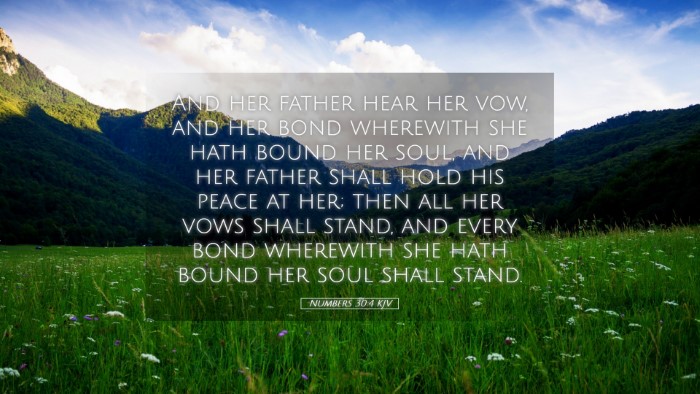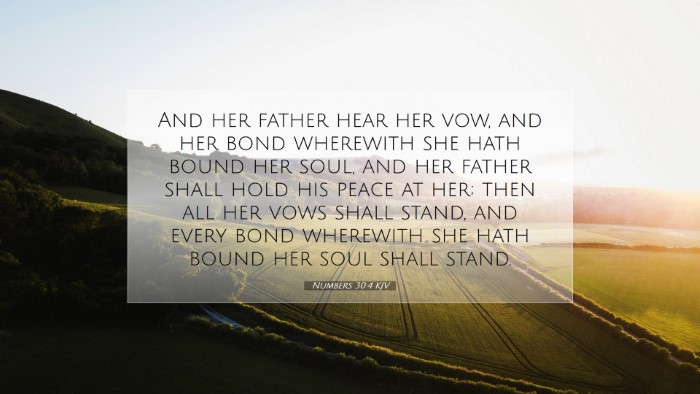Commentary on Numbers 30:4
Text of Numbers 30:4 (KJV): "And her father hear her vow, and her bond which she hath bound upon her soul, and her father shall hold his peace at her; then all her vows shall stand."
Introduction
The chapter of Numbers 30 deals with the regulations concerning vows and oaths, emphasizing the significance of the commitments one makes before God. This verse specifically addresses a woman’s vows in relation to her father's authority. Such verses provide profound insight into the nature of authority, accountability, and the dynamics within familial relationships, particularly in the context of ancient Israelite culture. The interpretations of this verse from various public domain commentaries offer valuable perspectives for pastors, students, and scholars alike.
Contextual Background
Understanding Numbers 30 requires a grasp of the laws surrounding vows present within the Mosaic covenant. Vows represented a serious commitment often made in devotion to God, and thus, regulating them ensured that individuals acted thoughtfully and responsibly. This chapter addresses three groups: single women, married women, and widows, concerning their vows and the respective reactions of their fathers or husbands.
Exegesis of Numbers 30:4
Matthew Henry interprets this verse within a framework of divine authority and human relationships. He notes, "The father’s silence implies his approval, suggesting that the vows made are essentially validated by his then-authoritative oversight." This underscores the importance of parental influence in a woman's spiritual commitments.
Albert Barnes elaborates further, stating that this procedure establishes a covenantal relationship between God and the individual, conditioned by human authority. “The lack of objection from the father signifies obedience not only to God but also to the familial oversight that stems from a divinely instituted order.” Thus, Barnes emphasizes the cultural norm of responsibility assumed by familial figures in matters of spiritual significance.
Theological Insights
Adam Clarke approaches this text by highlighting the gravity of making commitments in God's name. He explains, “The vow, once made, introduces solemnity and accountability to God,” reinforcing that promises should not be taken lightly. Clarke suggests that the father’s ability to annul or confirm the vow illustrates the necessity of communal and familial accountability in one’s relationship with God.
Implications for Modern Believers
The implications of Numbers 30:4 extend beyond cultural customs to deeply spiritual relevance for modern believers. There are several key themes:
- The Importance of Authority: The passage illustrates the roles of authority within family structures. In contemporary settings, this might prompt discussions about the dynamics of leadership, especially within church families and communities.
- Commitment and Accountability: This verse challenges believers to consider the weight of their words before God, highlighting how they should navigate their commitments responsibly and within the input of their community.
- Divine Oversight: The underlying message is one of divine oversight governing all things—vows are ultimately made before God, and His principles should guide interpersonal relationships.
Conclusion
Numbers 30:4 serves as a profound reminder of the interconnectedness between individual commitments to God and the communal structures that shape those commitments. The insights provided by Matthew Henry, Albert Barnes, and Adam Clarke reflect not only ancient wisdom but also practical applications for contemporary faith communities. For pastors, theologians, and students of the Bible, this verse invites ongoing reflection on the nature of vows, authority, and our relationships within the body of Christ.


